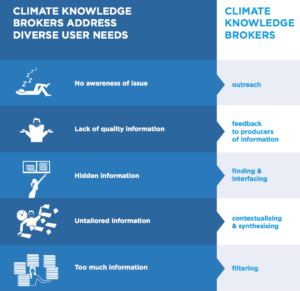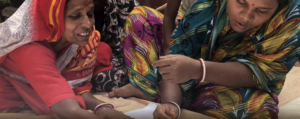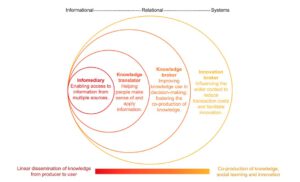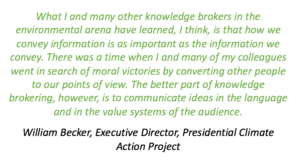Knowledge and Innovation Brokering – Bridging The Gap between Theory and Practice

Effective climate action in the 21st century relies on decisions fully informed by the best available climate knowledge. As a result, a somewhat new breed of professionals has developed – climate knowledge and innovation brokers (CDKN 2023, Scodanibbio et al. 2023, Gholasany & Havey 2023).
All PlanAdapt team members are climate adaptation knowledge and innovation brokers in their specific field of expertise and themes. We work with others (e.g. researchers) to affect changes in the agency and actions (Dablander et al. 2024) of decision-makers and ‘agents of change’ in the respective countries and sectors, to ensure that they are informed by the latest and most relevant research outputs. Knowledge brokering has a lot of other labels and overlaps with similar sets of activities and approaches, such as Research-Into-Use, Research To Action, Knowledge Into Action, Knowledge Mobilisation, Research Impact (Belcher et al. 2021), Research for Impact (Rawden et al. 2024) or Climate Services.
Overcoming Misalignment and Mismatch of Supply and Need
Despite significant advancements in scientific research around the drivers of climate risk, effective adaptation action in the Global South has been hindered by a misalignment between the production of expert climate knowledge and the information needs of decision-makers in practice (IISD 2019, Vincent et al., 2018; Kirchhoff et al., 2013). In particular, the disconnect between scientific, top-down approaches to knowledge production and the institutional and cultural contexts where adaptation decision-making takes place has been regularly cited as a significant barrier to the useability and uptake of climate knowledge (Harvey et al., 2021, Wyborn et al., 2019). As the impacts of climate change materialise, this persistent gap between theory and practice has resulted in increasing and often avoidable environmental, economic, and human losses from natural disasters and weather extremes (Albris et al., 2020).

The failure of climate research to spur the levels of action needed to effectively reduce and manage risks has turned attention to the emerging field of boundary work, and the role that knowledge brokers can play in improving the useability and impact of climate research (Bremer and Meisch, 2017, Daniels et al., 2020, Coninx 2023). Acting as intermediaries between the producers and users of information, knowledge brokers seek to facilitate the integration of a plurality of knowledge systems across regions, institutions and stakeholders at the interface of climate science and policy-making. The practice of boundary work and knowledge brokering has in this way been conceptualised as a set of processes, methods, and tools used to facilitate the co-production of tailored and actionable climate services.

Over the last 10 years knowledge brokering has made a significant impact in supporting effective decision-making and enabling adaptation action, leading to improved outcomes for disaster risk reduction and sustainable land management initiatives to name a few (Cummings et al., 2018). Moreover, it has been recognised that by facilitating dynamic processes of collaboration between stakeholders and institutions, integrating marginalised knowledge systems, and promoting mutual learning, boundary work has served an important role in developing the capacity of institutions and vulnerable communities to adapt to, mitigate and manage climate risks.
Good Practices in Process Design – Co-Production and Transdisciplinarity
Despite the increasing relevance of boundary work and knowledge brokering a standard best practice does not yet exist (Bremer et al., 2019). However, in recent years there has been an evident shift towards a ‘fifth generation’ of knowledge brokerage, reflecting a growing awareness that solving ‘wicked’ problems such as climate change requires participatory processes which integrate local knowledge systems and multiple stakeholders across sectors, (Hoppe et al., 2017). Within this fifth generation there is a clear emphasis on the importance of both the process of knowledge brokering as well as the production of climate services (Harvey et al., 2021), and guidelines such as the ‘The Climate Knowledge Broker’s Manifesto’ have highlighted that for boundary work to bring about long-term and transformational change, the processes, tools, and methods operationalised by brokers must be inclusive, participatory, and context-based.
 Co-production between stakeholders and transdisciplinarity within the actors involved have been identified as two key processes vital both for developing adaptative capacity, as well as challenging existing power imbalances between the producers and users of climate knowledge. However, some studies have found that boundary work has displayed uneven progress towards effective co-production, with inadequate attention being paid to the empowerment of typically marginalised voices. For knowledge brokering to lead to transformational change co-production must therefore deliberately focus on processes which are iterative and multi-directional, facilitating mutual social learning and challenging existing dynamics of power across the science, policy, and society interface. This requires taking into consideration whose knowledge is being empowered, for whose benefit, and whether this is representative of both the decision-making context and the plurality of stakeholders affected (Wyborn et al., 2019).
Co-production between stakeholders and transdisciplinarity within the actors involved have been identified as two key processes vital both for developing adaptative capacity, as well as challenging existing power imbalances between the producers and users of climate knowledge. However, some studies have found that boundary work has displayed uneven progress towards effective co-production, with inadequate attention being paid to the empowerment of typically marginalised voices. For knowledge brokering to lead to transformational change co-production must therefore deliberately focus on processes which are iterative and multi-directional, facilitating mutual social learning and challenging existing dynamics of power across the science, policy, and society interface. This requires taking into consideration whose knowledge is being empowered, for whose benefit, and whether this is representative of both the decision-making context and the plurality of stakeholders affected (Wyborn et al., 2019).
Learning based on Effective Monitoring
One key gap consistently identified in the practice of boundary work is the use of effective processes for long-term monitoring and evaluation (Vaughan et al., 2018). A variety of evaluation criteria for boundary work exists, split predominately between those which focus on the improved useability of climate information, and those which focus on the intangible benefits of boundary work such as capacity development, which have arisen from the process of itself. For knowledge brokers to ensure that these processes lead to effective decision-making and adaptation action, more emphasis must be placed on the development of feedback-loops, critical reflection around processes of stakeholder engagement, and the maintenance of long-term and dynamic collaborations between the producers and users of climate knowledge (Alexander and Dessai, 2019).
Co-Learning Systems and Communities of Practice – Innovative Structures to Enhance Knowledge Transmission

The pentagons represent the cooperation systems taking part in the broader co-learning system (source: OneOffTech, GIZ 2020)
In PlanAdapt, we constantly experiment with new ways of collective learning. An approach that our organisational model and the Climate Co-Adaptation Lab borrow ideas from, is a special type of community of practice approach: co-learning systems (GIZ 2020). Cooperative learning systems (in short co-learning systems) can be seen as a special type of CoP, whose members are participants of different cooperation systems and whose structures are set up with the primary goal of enhancing knowledge production and transmission in a specific field.
Online courses focusing on knowledge brokering tools, processes and case studies:
- Knowledge Broker Support Program (KBSP) online course by Commonwealth Scientific and Industrial Research Organisation (CSIRO)
- Integrating Climate Risk Information into NAPs by UN Climate Change Learning Partnership (UN CC:Learn)
- MOOC Research for Impact (University of Cape Town)
